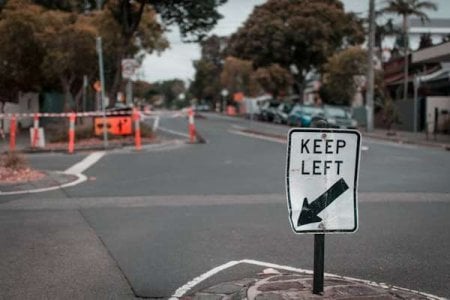Safety advocate shares massive road crisis costing billions every year
By
Danielle F.
- Replies 24
Seniors behind the steering wheel for decades have probably seen it all—tailgaters, speedsters, distracted drivers, and occasional daredevils weaving through traffic.
While many shake their heads or mutter words under their breath, there's a much bigger problem brewing on Australia's roads, and it's costing the nation billions.
National Road Safety Week has kicked off, and it's not just a reminder to slow down or buckle up on the road.
It's a call to action for all Australians to take road safety seriously.
Campaign founder Peter Frazer OAM launched the program after his daughter's untimely death due to a distracted truck driver.
He urged Aussies to rethink how they approach road safety as a whole.

'We need to flip everything on its head and start dealing with the reality of risk on our roads,' Mr Frazer said.
'We've got to have our governments start doing much more active enforcement, both police enforcement and also automated enforcement, which we can do immediately.'
According to statistics, road trauma and offences have cost Australia about $30 billion annually.
This price tag has included medical expenses, emergency services, lost productivity, and the heartbreaking toll on families and communities.
In the past four years, annual deaths have jumped from around 1,140 to more than 1,300.
While road enforcement changes have been implemented across Australia, Mr Frazer urged everyone to be vigilant on the road.
'The very first thing that we need to do is to flip everything on its head and start dealing with the reality of risk on our roads,' Mr Frazer said.
'That's the first thing. We've got to have our governments start doing much more active enforcement, both police enforcement and also automated enforcement, which we can do immediately.'
So, what's behind this worrying trend on the road?
Many senior drivers have decades of driving experience under their belts.
With road rules changing now and then, here are some ways to help keep Aussie roads safe:
'We've got to also recognise—it costs $30 billion in road trauma in Australia every year. Can you imagine the savings to the national economy if we reduced the number of people killed by that 50 per cent?' he asked.

Have you noticed changes in driver behaviour since the pandemic? Is enough being done to keep our roads safe? Share your thoughts and experiences on the road in the comments section below.
While many shake their heads or mutter words under their breath, there's a much bigger problem brewing on Australia's roads, and it's costing the nation billions.
National Road Safety Week has kicked off, and it's not just a reminder to slow down or buckle up on the road.
It's a call to action for all Australians to take road safety seriously.
Campaign founder Peter Frazer OAM launched the program after his daughter's untimely death due to a distracted truck driver.
He urged Aussies to rethink how they approach road safety as a whole.

Drivers and the general public need to be more aware of road rules. Image Credit: Pexels/Connor Forsyth
'We need to flip everything on its head and start dealing with the reality of risk on our roads,' Mr Frazer said.
'We've got to have our governments start doing much more active enforcement, both police enforcement and also automated enforcement, which we can do immediately.'
According to statistics, road trauma and offences have cost Australia about $30 billion annually.
This price tag has included medical expenses, emergency services, lost productivity, and the heartbreaking toll on families and communities.
In the past four years, annual deaths have jumped from around 1,140 to more than 1,300.
While road enforcement changes have been implemented across Australia, Mr Frazer urged everyone to be vigilant on the road.
'The very first thing that we need to do is to flip everything on its head and start dealing with the reality of risk on our roads,' Mr Frazer said.
'That's the first thing. We've got to have our governments start doing much more active enforcement, both police enforcement and also automated enforcement, which we can do immediately.'
So, what's behind this worrying trend on the road?
- Speeding: This has been one of the biggest road killers, responsible for around 40 per cent of fatalities. Speeding remains a serious problem even in school zones.
- Distracted driving: Mobile phones, in-car entertainment systems, and even GPS devices have been taking drivers' attention off the road.
- Complacency and risky behaviour: Since the pandemic, there's been a noticeable uptick in erratic and dangerous driving, with some motorists treating quieter roads as a green light to break the rules.
- Lack of enforcement: While police and speed cameras are in place, Mr Frazer argued that drivers need to go back to the 'anywhere, anytime' approach—where drivers know they could be checked at any moment.
Many senior drivers have decades of driving experience under their belts.
With road rules changing now and then, here are some ways to help keep Aussie roads safe:
- Lead by example: Stick to the speed limits, avoid distractions, and always wear seat belts.
- Speak up: Sometimes, a reminder is all it takes to keep everyone safe.
- Stay informed: Keep up to date with changes to road rules and safety campaigns.
'We've got to also recognise—it costs $30 billion in road trauma in Australia every year. Can you imagine the savings to the national economy if we reduced the number of people killed by that 50 per cent?' he asked.
Key Takeaways
- One of Australia's road safety advocates called for urgent action to address the root causes of dangerous driving.
- The financial cost of road trauma in Australia has reached $30 billion annually and could increase if adequate measures are not implemented.
- Speeding has been identified as a major contributor to road fatalities, responsible for about 40 per cent of all deaths.
- Despite a national strategy to halve road deaths by 2030, current numbers are well above target, highlighting an urgent need for renewed government commitment for road safety.







